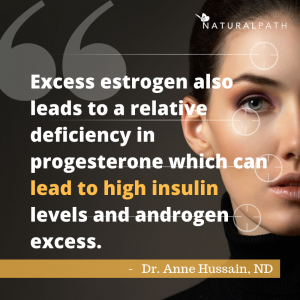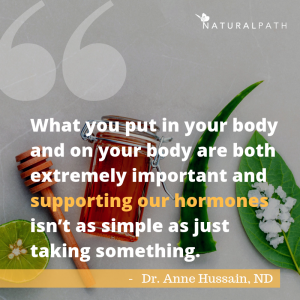 Like any other system in our body, the skin is complex in its function as well as in its response to stimuli. When we age, the elasticity in our skin decreases and we can get wrinkles and sagging. When we have inflammatory responses in the body, these can manifest as hives, eczema, and psoriasis. When we’re stressed and/or our hormones need support, we can get acne and rosacea. When we don’t protect our skin from the sun, we can get hyperpigmentation and dark spots. When our immune system is down or the physical barrier needs support, we can get skin infections like tinea and folliculitis. There are so many variables – internal and external – that are important to address when it comes to the skin.
Like any other system in our body, the skin is complex in its function as well as in its response to stimuli. When we age, the elasticity in our skin decreases and we can get wrinkles and sagging. When we have inflammatory responses in the body, these can manifest as hives, eczema, and psoriasis. When we’re stressed and/or our hormones need support, we can get acne and rosacea. When we don’t protect our skin from the sun, we can get hyperpigmentation and dark spots. When our immune system is down or the physical barrier needs support, we can get skin infections like tinea and folliculitis. There are so many variables – internal and external – that are important to address when it comes to the skin.
The role some of the commonly-known hormones play in our skin health
Cortisol: Cortisol is also known as the stress hormone. It is produced by our adrenal glands on a daily basis and our bodies will make more on an as-needed basis, but sometimes our bodies can’t keep up with our demand. Cortisol helps fuel our fight-or-flight response, regulates inflammation and blood pressure, manages the utilization of our fuel sources, and is responsible for our sleep-wake cycle.
High amounts of stress can lead to cortisol dysregulation and a variety of effects that can change our skin such as:
- Altered sex hormone levels leading to increased sebum production and inflammatory skin responses like acne, rosacea, and eczema
- Increased oxidative damage that can harden collagen and lead to more wrinkles
- Altered microbiome which can lead to cold sores, acne, eczema, fungal infections, and more
Insulin: We all know insulin as the hormone that is responsible for blood sugar regulation. Our blood sugar levels, and our blood insulin levels both play a big role in skin health.
Insulin resistance, which is when our tissues become less responsive to insulin in our bloodstream, is associated with a variety of skin changes such as:
- Increased acne, hirsutism (excess hair growth), and androgenic alopecia
- Skin tags and thickened dark skin (acanthosis nigricans)
- Increased incidence of inflammatory conditions like psoriasis
Thyroid Hormones: The thyroid plays an important role in regulating our other hormones in the body, as well as being responsible for our metabolism and energy levels. When the thyroid isn’t functioning properly, the skin changes that can result in redness, hives, excessive dryness or oiliness, and coarse skin.
Estrogen & Progesterone: These two hormones are known as the female hormones and they are both significant in skin (and overall) health and their levels in relation to one another is crucial.
Declining estrogen as we age can lead to changes such as decreased elasticity, increased skin fragility, and increased dryness.
On the other hand, excess estrogen can lead to melasma (often seen in pregnancy) and other inflammatory skin conditions usually through a shift in other hormones. Excess estrogen also leads to a relative deficiency in progesterone which can lead to high insulin levels and androgen excess.
Testosterone: Known as the male hormone, testosterone levels are important for males and females. One of the biggest consequences of high levels of testosterone is excess sebum production, which can lead to more clogged pores and acne.
Some tips to address skin & hormonal issues
 What you put in your body and on your body are both extremely important and supporting our hormones isn’t as simple as just taking something. There’s a lot of interplay between all the systems in our body and a multifaceted approach is what’s needed.
What you put in your body and on your body are both extremely important and supporting our hormones isn’t as simple as just taking something. There’s a lot of interplay between all the systems in our body and a multifaceted approach is what’s needed.
– Avoid inflammatory foods. These can shift all your hormones and create inflammatory skin responses. Refined sugar, deep-fried foods, peanuts, eggs, corn, wine, and dairy are common culprits.
– Stay hydrated. There’s no magic number of glasses to work towards, but as an adult, most of us need at least 6 glasses of water per day. Most of us need more depending on physical activity levels, coffee consumption, stress levels, and more. Our bowels, kidneys, blood pressure, energy levels, muscles and skin all suffer when we’re not properly hydrated.
– Incorporate more fiber. If our elimination organs aren’t working well, toxins and hormonal metabolites will stay in our bodies longer and can even be reabsorbed. So, make sure to eat fruits and vegetables, ground flax seeds, chia seeds, and other fiber-rich foods regularly.
– Support the body’s detoxification and elimination pathways. This means providing regular support to our liver, digestive and urinary tracts, and skin on a regular basis. Sweating, eating dark green leafy vegetables, perhaps using a B complex, ensuring adequate water and fiber intake are ways to accomplish this.
– Specific hormonal support. This will vary from person to person, depending on symptom picture, blood work, saliva testing, and other diagnostic parameters. Guidance from a healthcare professional is important here. Some examples of hormonal support are seed cycling, taking herbs like chaste tree for progesterone support or black cohosh for estrogen support, supplementing with DIM to help with estrogen dominance, using spearmint tea and/or saw palmetto for excess androgens, and taking adrenal support to help with cortisol levels.
– Eat mineral- and vitamin-rich foods for overall health. Fruits and vegetables are our best friends when it comes to eating mineral-and-vitamin-dense foods. Specific nutrients that are great for skin health include vitamin C, zinc, vitamin A, vitamin E, and omega-3s. Making sure you eat adequate protein and healthy fats is also important for hormone and skin health.
– Avoid toxic chemicals, hormone disruptors, and harsh irritants. These include parabens, phthalates, PCBs, BPA, triclosan and alcohol, among others. Remember, what you put on your body ends up in your body, so the quality of your skincare regimen is very important. Not only that, most commercial brands of personal care products and make-up are laden with endocrine disruptors that are best avoided.
– Use organic, plant-based skin care products that are environmentally friendly. These products generally are packed with antioxidants that will help heal and protect your skin. Make sure to use sunscreen that is reef-friendly and devoid of hormone disruptors that are commonly found in commercial brands.
– Seek professional help. Work with a healthcare professional who will help get to the bottom of any skin concerns.
– Move often. Exercise and movement are crucial to good health – supporting our metabolism and hormones, releasing waste through sweating, uplifting mood, decreasing stress, and regulating sleep. Small bouts of movement multiple times a day such as going up and down the stairs a few times, stretching, pacing/walking, doing 10 squats can be a simple way of introducing more movement if a regimented plan is unfeasible.
– Sleep well. Sleep is crucial to cortisol and insulin regulation, energy levels, elimination and detoxification, and our inflammatory responses. When we don’t get restful sleep, nothing seems to work well and it’s because we need that time of regeneration to heal, detoxify, and reset. If sleep is an issue, work with a healthcare professional to get that back on track. Herbs and supplements such as passionflower, valerian, magnesium, melatonin, and lavender can be really helpful if this is an issue.
– Implement stress-reduction techniques. We all have stress and it can manifest differently for each one of us. Having techniques at your disposal that work for you and making them a priority is key for healthy skin and hormone balance. Whether it’s through yoga, meditation, exercise, arts, music, traveling, or reading, make sure to make the things that bring peace a priority. There are many herbs and supplements that can support our physiology for improved resilience as well; these include B complex, magnesium, holy basil, licorice, reishi, and rhodiola.
– Be compassionate. Our positive and negative mental talk makes a HUGE difference in what hormones and neurotransmitters are released in our bodies. Instead of fixating on a problem area, focusing on a positive aspect of ourselves (which can be difficult) is a way to mitigate self-consciousness. Extending ourselves the kindness we would extend to a dear friend is a good way of thinking about this. Seeking professional help with a psychologist, social worker, or a doctor can help as well.
Photo by A L L E F . V I N I C I U S Δ on Unsplash
 Dr. Anne Hussain, ND is passionate about empowering women to take charge of their health and lives. Her expertise is in the area of hormonal changes, fertility, pregnancy, and perinatal care. She is also a birth doula who supports mamas-to-be have a positive birth experience.
Dr. Anne Hussain, ND is passionate about empowering women to take charge of their health and lives. Her expertise is in the area of hormonal changes, fertility, pregnancy, and perinatal care. She is also a birth doula who supports mamas-to-be have a positive birth experience.
Dr. Anne practices out of Aurora, Ontario, Canada and is a board-certified naturopathic doctor with the College of Naturopaths of Ontario. She loves drinking tea, spending time in nature, reading fantasy books, and preparing and eating vegan food. More information about her and her practice can be found on her website: www.annehussain.com.

















